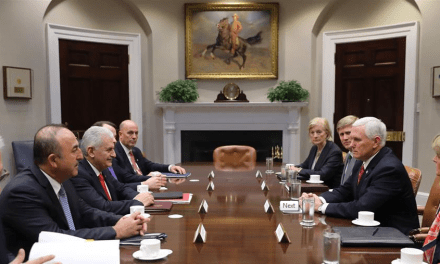By Ilhan Tanir, Ahval
The United States Congress’ Armed Services Committee released on Friday a “FY19 National Defense Authorization Bill,” in which the chairman calls for a halt on weapons sales to Turkey.
The $717 billion bill needs to be approved by the floor and Chairman’s call is unlikely to be dropped in the final bill.
Turkey and the United States have had a rough patch in their relations since the Jul. 15 2016 coup attempt. Turkish President Recep Tayyip Erdoğan has demanded the extradition of Turkish cleric Fethullah Gulen, who has been living in Pennsylvania, due to his alleged leading role in the failed coup. Erdoğan’s government has also expressed anger at the U.S. administration’s policy with regards to the Syrian Kurdish groups such as the People’s Protection Units (YPG), which have been allies of the United States in northern Syria against the Islamic State militants since the late 2014.
The Armed Forces committee bill requires “the Secretary of Defense, in consultation with the Secretary of State, to submit a report on the U.S.-Turkish relationship to” the congressional committees, “not later than 60 days after the date of the enactment” of the bill.
The legislation also prohibits to deliver military sales to Turkey “until the required report is delivered to the specified congressional committees.”
Ankara has been a joint partner for the F-35 fifth generation fighter jets and is projected to receive over 100 F-35s in upcoming years.
Turkey is also in the process of buying the S-400 air defence system from Russia, a deal which the U.S. government have threatened to sanction the country over. Turkish Foreign Minister Mevlüt Çavuşoğlu, after his first meeting with U.S. Secretary of State Mike Pompeo in Brussels two weeks ago, stated that the purchase of the S-400 systems is a done deal. Çavuşoğlu is expected to visit Washington to meet with Pompeo in May.
According to the “findings” of the bill, the recent “strained” relationship between Turkey and the U.S. government is “due to several provocative actions taken by the Government of Turkey. The potential purchase by the Government of Turkey of the S-400 air and missile defense system from the Russian Federation has led to tension with the relationship.”
The U.S. bill says these actions of the Ankara government “could negatively impact common weapon system development between the United States and Turkey.” What is more, the same bill says, the Ankara government’s actions “could impact current bilateral agreements between the United States and Turkey.”
The legislation prohibits delivery of weapons until the report has been prepared. In the report, “an assessment of United States military and diplomatic presence in Turkey, including all military activities conducted from Incirlik Air Base or elsewhere” has been requested.
İncirlik, in southern Turkey, is the site of a major U.S. airbase that services operations around the Middle East region and acts as a vital transit link to areas as far afield as Afghanistan.
The bill also asks other U.S. institutions to prepare “an assessment of the potential purchase by the Government of Turkey of the S400 air and missile defense system from the Russian Federation and the potential effects of such purchase on the United States-Turkey bilateral relationship, including an assessment of impacts on other United States weapon systems and platforms operated jointly with Turkey to include—
(i) the F-35 Lightning II Joint Strike aircraft, to include co-production;
(ii) the Patriot surface-to-air missile system;
(iii) the CH-47 Chinook heavy lift helicopter;
(iv) the AH-1 Attack helicopter;
(v) the H-60 Black Hawk utility helicopter; and
(vi) the F-16 Fighting Falcon aircraft.”


















